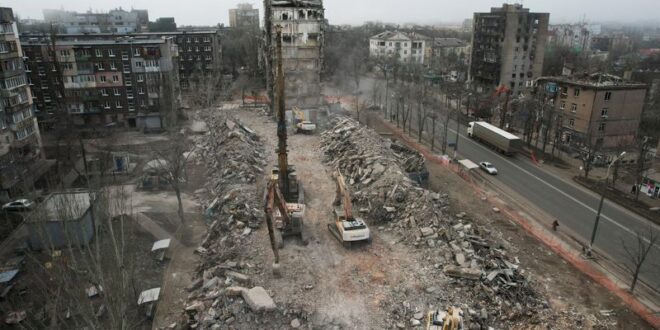KYIV (Reuters) – Ukraine has identified 511 people suspected of war crimes since Russia’s Feb. 2022 invasion and has already handed down 81 convictions, its prosecutor general said in Kyiv on Thursday.
Andriy Kostin was speaking at a war crimes conference alongside the chief prosecutors of Poland, Lithuania, Romania and the President of the EU justice arm, Eurojust.
At a press conference after their meeting, the prosecutors announced the signing of a two-year extension to the work of the Joint Investigation Team, an initiative by five European Union countries to probe war crimes in the conflict.
Russia has denied its troops commit war crimes, despite the conflict having killed thousands of Ukrainian civilians.
The JIT is conducting what Eurojust chief Ladislav Harman called the “biggest investigation of war crimes in history.”
Lithuanian Prosecutor General Nida Grunskiene said the JIT had so far spoken to over 5,000 Ukrainians as part of their investigations.
Commenting on the 81 convictions, Kostin acknowledged that most had been conducted without the suspects in custody.
He said Ukraine wanted to get justice as quickly as possible instead of waiting until the end of the war.
“Most of these convictions are in absentia, but it speaks to the fact that we are securing justice right now,” he said.
Kostin added that discussions were taking place with more than 40 countries about the possibility of forming a war crimes tribunal. He indicated that a decision on the format of the panel this year would be “a powerful signal”, but did not say more about when it could start.
He said such a tribunal was likely to last several years once it began.
Kostin and Grunskiene said investigators had managed to establish the identities of three people, all pro-Russian militants from the Donetsk region, suspected of killing Lithuanian film director Mantas Kvedaravicius in the city of Mariupol.
Kvedaravicius’ death was announced by Ukraine’s defence ministry in April 2022. Kostin on Thursday said the film director had died as a result of torture inflicted by the three suspects, including broken bones, knife wounds and a mock execution.
The director was filming a documentary showing the suffering of Mariupol’s residents during a brutal, months-long siege of the city by advancing Russian forces. The documentary, Mariupolis 2, was released several months after his death.
(Reporting by Max Hunder, Editing by William Maclean)
 BeritaKini.biz Berita Viral Terkini di Malaysia
BeritaKini.biz Berita Viral Terkini di Malaysia





